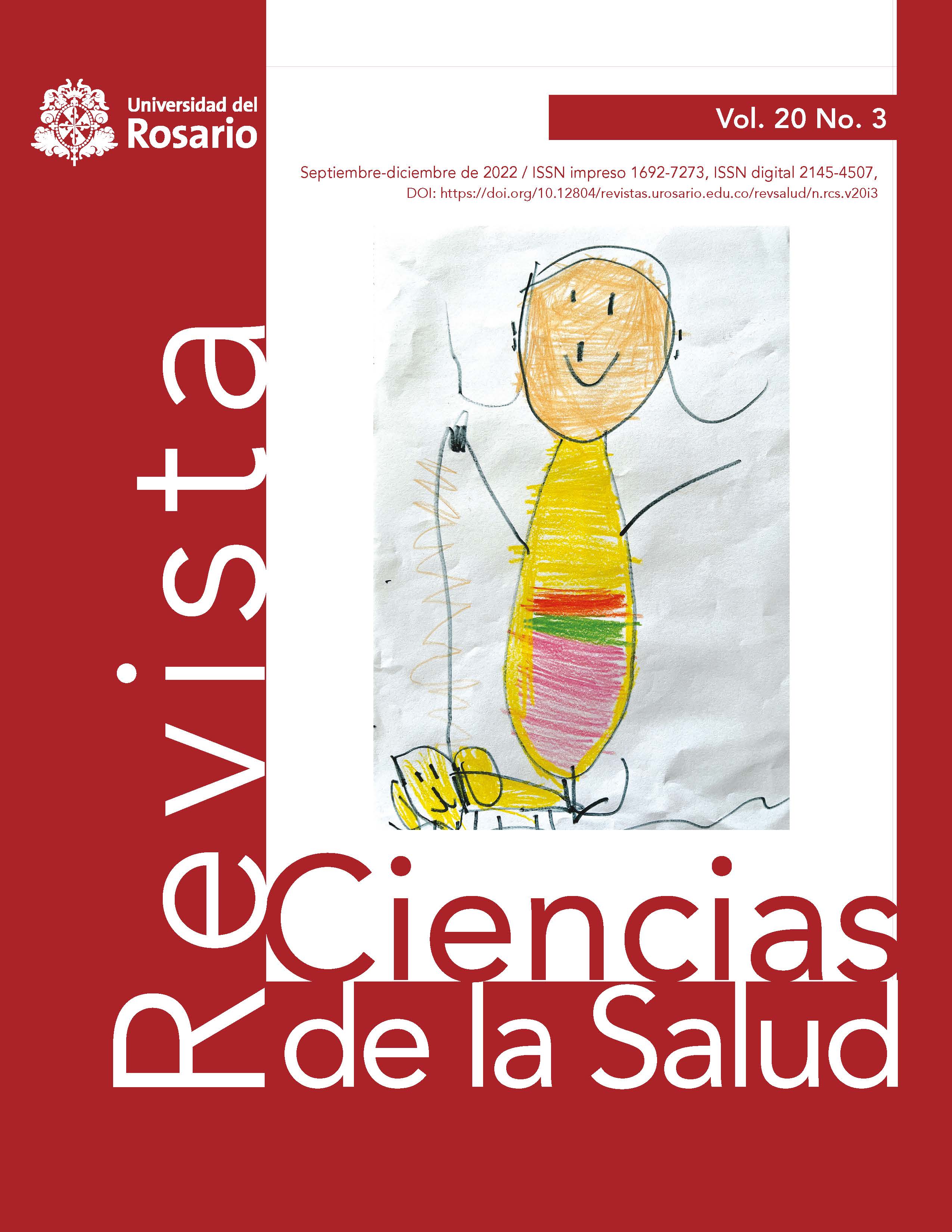Las prácticas de integración cuerpo-mente como promotoras de estados emocionales saludables
Barra lateral del artículo
Contenido principal del artículo
 Mariana Lozada
Mariana Lozada
Introducción: recientes investigaciones provenientes de diversos campos emergentes como la psiconeuroinmunología, la medicina integrativa o la epigenética han dado cuenta de la estrecha vinculación entre los estados emocionales y la salud. El objetivo fue evaluar la eficacia de una intervención basada en la realización de prácticas de integración cuerpo-mente sobre la regulación emocional. Materiales y métodos: en 102 participantes, de entre 34 y 65 años de edad, se analizaron cambios en la Escala de Afectividad Positiva y Negativa (panas), antes y después de participar en la intervención propuesta, que se realizó durante ocho encuentros de seis horas de duración cada uno, a lo largo de cuatro meses. Resultados: se encontró un aumento en la afectividad positiva y una disminución en la afectividad negativa luego de la intervención. El índice de afectividad (i. e. afectividad positiva/afectividad negativa) se incrementó de una relación 2:1 a una relación 3:1. Esta última proporción ha sido asociada con estados saludables. Conclusiones: el estudio contribuye a demostrar el beneficio que brindan las prácticas de integración cuerpo-mente en la regulación emocional y la afectividad positiva. Esto podría propiciar un mayor bienestar psicofísico individual y colectivo.
Descargas
Dossett ML, Fricchione GL, Benson H. A new era for mind–body medicine. N Eng J Med. 2020;382(15):1390. https://doi.org/10.1056/nejmp1917461
Fogaça LZ, Portella CF, Ghelman R, Abdala CV, Schveitzer MC. Mind-body therapies from traditional chinese medicine: evidence map. Front Public Health. 2021;9. https://doi.org/10.3389/fpubh.2021.659075
Meister K, Juckel G. A systematic review of mechanisms of change in body-oriented yoga in major depressive disorders. Pharmacopsychiatry. 2018;51(03):73-81. https://doi.org/10.1055/s-0043-111013
Kim SH, Schneider SM, Kravitz L, Mermier C, Burge MR. Mind-body practices for posttraumatic stress disorder. J Intregr Med. 2013;61(5):827-34. https://doi.org/10.2310/JIM.0b013e3182906862
Cohen S, Doyle WJ, Turner RB, Alper CM, Skoner DP. Emotional style and susceptibility to the common cold. Psychosom Med. 2003;65(4):652-7. https://doi.org/10.1097/01.psy.0000077508.57784.da
Colombetti G, Zavala E. Are emotional states based in the brain? A critique of affective brainocentrism from a physiological perspective. Biol Philos. 2019 Oct;34(5):1-20. https://doi.org/10.1007/s10539-019-9699-6
Varela F. El fenómeno de la vida. Santiago: Dolmen; 2000.
Colombetti G. Enactive affectivity, extended. Topoi. 2017;36(3):445-55. https://doi.org/10.1007/s11245-015-9335-2
Colombetti G, Krueger J, Roberts T. Affectivity beyond the skin. Front Psychol. 2018;9:1307. https://doi.org/10.3389/fpsyg.2018.01307
Bach D, Groesbeck G, Stapleton P, Sims R, Blickheuser K, Church D. Clinical eft (emotional freedom techniques) improves multiple physiological markers of health. J Evid Based Integr Med. 2019;24:25. https://doi.org/10.1177/2515690X18823691
D’Acquisto F. Affective immunology: where emotions and the immune response converge. Dialogues Clin Neurosci. 2022. https://doi.org/10.31887/DCNS.2017.19.1/fdacquisto
Ader R, Cohen N. Psychoneuroimmunology: interactions between the nervous system and the immune system. Lancet. 1995;345(8942):99-103. https://doi.org/10.1016/s0140-6736(95)90066-7
Rosenkranz MA, Davidson RJ, MacCoon DG, Sheridan JF, Kalin NH, Lutz A. A comparison of mindfulness-based stress reduction and an active control in modulation of neurogenic inflammation. Brain Behav Immun. 2013;27:174-84. https://doi.org/10.1016/j.bbi.2012.10.013
Liu YZ, Wang YX, Jiang CL. Inflammation: the common pathway of stress-related diseases. Front Hum Neurosci. 2017;11:316. https://doi.org/10.3389/fnhum.2017.00316
McEwen BS. In pursuit of resilience: stress, epigenetics, and brain plasticity. Ann N Y Acad Sci. 2016;1373(1):56-64. https://doi.org/10.1111/nyas.13020
D’Adamo P, Lozada M. Una intervención centrada en prácticas de atención plena (mindfulness) promueve la regulación emocional y la reducción del estrés en profesores. Ansiedad Estrés. 2019;25(2):66-71. https://doi.org/10.1016/j.anyes.2019.10.002
Kral TR, Schuyler BS, Mumford JA, Rosenkranz MA, Lutz A, Davidson RJ. Impact of shortand long-term mindfulness meditation training on amygdala reactivity to emotional stimuli. Neuroimage. 2018;181:301-13. https://doi.org/10.1016/j.neuroimage.2018.07.013
Maizes V, Rakel D, Niemiec C. Integrative medicine and patient-centered care. Explore. 2009;5(5):277-89. https://doi.org/10.1016/j.explore.2009.06.008
Shah AK, Becicka R, Talen MR, Edberg D, Namboodiri S. Integrative medicine and mood, emotions and mental health. Prim Care: Clinics in Office Practice. 2017;44(2):281-304. https://doi.org/10.1016/j.pop.2017.02.003
Pascoe MC, Thompson DR, Ski CF. Yoga, mindfulness-based stress reduction and stress related physiological measures: a meta-analysis. Psychoneuroendocrinology. 2017;86:152-68. https://doi.org/10.1016/j.psyneuen.2017.08.008
Delgado LC, Guerra P, Perakakis P, Viedma MI, Robles H, Vila J. Eficacia de un programa de entrenamiento en conciencia plena (mindfulness) y valores humanos como herramienta de regulación emocional y prevención del estrés para profesores. Psicol Conductual. 2010;18(3):511.
Silva-Zemanate MA, Pérez-Solarte SL, Fernández-Cerón MI, Tovar-Ruíz LÁ. Efectos del Tai Chi en la capacidad funcional de un grupo de mujeres ancianas. Rev Cienc Salud. 2014;12(3):353-69. https://doi.org/10.12804/revsalud12.03.2014.05
Rodrigues JM, Mestre M, Fredes LI. Qigong in the treatment of children with autism spectrum disorder: A systematic review. J Integr Med. 2019;17(4):250-60. https://doi.org/10.1016/j.joim.2019.04.003
Altamirano Quevedo C, Castillo Viera E, Rodríguez Pascual I. Biodanza: revisión sistemática sobre los beneficios de una práctica emergente en la promoción de la salud y el bienestar. Retos. 2021;39:844-8. https://doi.org/10.47197/retos.v0i39.73348
Davidson RJ, McEwen BS. Social influences on neuroplasticity: stress and interventions to promote well-being. Nat Neurosci. 2012;15(5):689-95. https://doi.org/10.1038/nn.3093
Kilpatrick LA, Suyenobu BY, Smith SR, Bueller JA, Goodman T, Creswell JD, Tillisch K, Mayer EA, Naliboff BD. Impact of mindfulness-based stress reduction training on intrinsic brain connectivity. Neuroimage. 2011;56(1):290-8. https://doi.org/10.1016/j.neuroimage.2011.02.034
Thompson M, Gauntlett-Gilbert J. Mindfulness with children and adolescents: effective clinical application. Clin Child Psychol Psychiatry. 2008;13(3):395-407. https://doi.org/10.1177/1359104508090603
Laghi F, Lonigro A, Pallini S, Baiocco R. Emotion regulation and empathy: which relation with social conduct? J Genet Psychol. 2018;179(2):62-70. https://doi.org/10.1080/00221325.2018.1424705
Shonin E, Van Gordon W, Compare A, Zangeneh M, Griffiths MD. Buddhist-derived loving-kindness and compassion meditation for the treatment of psychopathology: a systematic review. Mindfulness. 2015;6(5):1161-80. https://doi.org/10.1007/s12671-014-0368-1
Goyal M, Singh S, Sibinga EM, Gould NF, Rowland-Seymour A, Sharma R, Berger Z, Sleicher D, Maron DD, Shihab HM, Ranasinghe PD. Meditation programs for psychological stress and well-being: a systematic review and meta-analysis. JAMA Intern Med. 2014;174(3):357-68. https://doi.org/10.1001/jamainternmed.2013.13018
Mehling WE, Wrubel J, Daubenmier JJ, Price CJ, Kerr CE, Silow T, Gopisetty V, Stewart AL. Body Awareness: a phenomenological inquiry into the common ground of mind-body therapies. Philos Ethics Humanit Med. 2011;6(1):1-2. https://doi.org/10.1186/1747-5341-6
Azañedo CM, Sastre S, Artola T, Alvarado JM, Jiménez-Blanco A. Social intelligence and psychological distress: subjective and psychological well-being as mediators. Int J Environ Res Public Health. 2020;17(21):7785. https://doi.org/10.3390/ijerph17217785
Crawford JR, Henry JD. The Positive and Negative Affect Schedule (PANAS): construct validity, measurement properties and normative data in a large non-clinical sample. Br J Clin Psychol. 2004;43(3):245-65. https://doi.org/10.1348/0144665031752934
Watson D, Clark LA, Tellegen A. Development and validation of brief measures of positive and negative affect: the PANAS scales. J Pers Soc Psychol. 1988;54(6):1063-70. https://doi.org/10.1037/0022-3514.54.6.1063
Moriondo M, De Palma P, Medrano LA, Murillo P. Adaptación de la Escala de Afectividad Positiva y Negativa (PANAS) a la población de adultos de la ciudad de Córdoba: análisis psicométricos preliminares. Univ Psychol. 2012;11(1):187-96. https://doi.org/10.11144/Javeriana.upsy11-1.aeap
Fredrickson BL, Losada MF. Positive affect and the complex dynamics of human flourishing. Am Psychol. 2005;60(7):678-86. https://doi.org/10.1037/0003-066X.60.7.678
Kabat-Zinn J, Hanh TN. Full catastrophe living: using the wisdom of your body and mind to face stress, pain, and illness. Delta;2009 Jul 22.
Carr A. Psicología positiva: la ciencia de la felicidad. Barcelona: Grupo Planeta; 2007.
Eisenberg N, Spınrad TL, Knafo-Noam A. Prosocial development. En: Handbook of child psychology and developmental science. Wiley; 2015. p. 1-47.
Tyrka AR, Carpenter LL, Kao HT, Porton B, Philip NS, Ridout SJ, Ridout KK, Price LH. Association of telomere length and mitochondrial DNA copy number in a community sample of healthy adults. Exp Gerontol. 2015;66:17-20. https://doi.org/10.1016/j.exger.2015.04.002
Van Cappellen P, Rice EL, Catalino LI, Fredrickson BL. Positive affective processes underlie positive health behaviour change. Psychol Health. 2018;33(1):77-97. https://doi.org/10.1080/08870446.2017.1320798
Goldin PR, Gross JJ. Effects of mindfulness-based stress reduction (MBSR) on emotion regulation in social anxiety disorder. Emotion. 2010;10(1):83-91. https://doi.org/10.1037/a0018441
Hölzel BK, Lazar SW, Gard T, Schuman-Olivier Z, Vago DR, Ott U. How does mindfulness meditation work? Proposing mechanisms of action from a conceptual and neural perspective. Perspect Psychol Sci. 2011;6(6):537-59. https://doi.org/10.1177/1745691611419671
Kok BE, Fredrickson BL. Upward spirals of the heart: autonomic flexibility, as indexed by vagal tone, reciprocally and prospectively predicts positive emotions and social connectedness. Biol Psychol. 2010;85(3):432-6. https://doi.org/10.1016/j.biopsycho.2010.09.005
Detalles del artículo

Esta obra está bajo una licencia internacional Creative Commons Atribución-NoComercial-SinDerivadas 4.0.
Los manuscritos postulados a la Revista Ciencias de la Salud deben ser originales e inéditos y no deben estar simultáneamente en proceso de publicación en otras revistas, compilaciones o cualquier otro medio de publicación. Los derechos de autor serán de la Universidad del Rosario. Cuando el autor quiera publicar el manuscrito en otra publicación, deberá pedir a la Editorial de la Universidad del Rosario los permisos correspondientes. De igual forma, cuando la Revista Ciencias de la Salud esté interesada en publicar artículos que ya han sido publicados en otras revistas, procederá a solicitar los permisos correspondientes en la editorial donde se realizó la primera publicación.
Bajo una Creative Commons Attribution License los autores pueden compartir el trabajo con un reconocimiento de la autoría del trabajo y la publicación inicial en esta revista.



